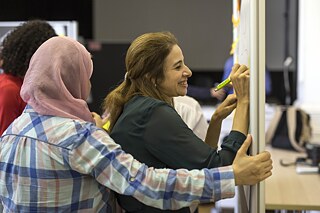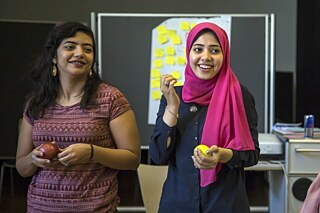“Safe Spaces” to Counter Bullying and Social Violence

By Aya Nabil
In digital classroomsworkshop participants have split into several small groups, each presenting an improvised scene of “harassment”, one of the forms of gender-based violence. Their discussions are productive. Each one of them contributes their ideas, actively breaking down the barriers of fear and shame that often prevent people from participating in the discourse, much less opening up about their own exposure to violence. At the end of the workshop, participants have transformed from trainees to trainers: Now they have to plan for imparting their newly gained knowledge to the children and youth of their areas.
During the months September and October, 42 young men and women participated in these discussions during three training workshops, organised by the Goethe-Institut Cairo as part of their Women and Gender projects, and more specifically “Gender Awareness[JD1] ” project which it implements in partnership with the Ministry of Youth and Sport in 2020/2021.
The Goethe-Institut devotes this project to the training of young trainers, joining from ministerial centres and non-governmental institutions across Egypt’s governorates alike. The gender training guides participants to challenge gender stereotypes that fuel multiple forms of violence and empowers them to implement activities and training sessions in their local contexts.
Freedom of Expression as Unconditional Right

Shady holds the training sessions together with Sondos Shabayek, building on the booklet Tahaddy al-Ada (“Challenging the Habit”), which theydeveloped and wrotein 2017 for the Goethe-Institut with the support of the Dialogue & Transition programme. The booklet provides instructors with a model for the use of storytelling and drama techniques in activities for children andyouth that help them to reflect, discuss, and express themselves and to resolve conflicts in a healthy and safe manner, while supporting the learning process by creating an environment that does not tolerate gender-based violence,stereotypes, and stigmatisation of free expression.
Shady says that the project seeks to shape facilitators who understand their role not in imposing opinions and agendas on children and youth, but in encouraging them to speak themselves about the social pressures they perceive and suffer from mentally. “When children listen to each other, they discover that they are not alone in facing these fears or pressure,” he adds.“They can then understand and accept what the facilitator has to offer in terms of awareness-raising on stereotyping, bullying, and associated violence, and learn how to oppose it.”
Shady describes the cooperation between the Goethe-Institut and the Ministry as “an important step” which opens up new possibilities for the participants to implement activities in their local contexts and to apply what they learn from working with children and youth within these activities. To change conventional thought, on the other hand, makes it easier to deal with these problems and to startbreaking down stereotypical perceptions.
Shady and Sondos’ decision to move their workshop to the internet resulted from the social distancing measures introduced to counter the spread of COVID-19. As a consequence, the trainers had to tailor all contents and structures of the trainingto the conditions of the new medium.
However, “The only obstacle was that some regions didn’t have internet access,” Sondos says and adds, “But the advantage of the remote workshops was that we were able to reach participants who could not have joined had we held them in Cairo as previously planned, for example because they live too far away or, in the case of women, because they are not allowed to travel too far from their family, as it is the case in some governorates of Upper Egypt.”
“We Welcome Cooperation”
Mohammed Faisal, head of the arts office at the Ministry of Youth and Sport, explains that his Ministry’s efforts have beenfocused on fighting bullying and gender-based violence. The cooperation with the Goethe-Institut on this project therefore contributed to achieving the goals of both parties. “It is important that we have trainers from all governorates who are qualified to implement such training sessions,” he remarks.Faisalalso points out that, given the multitude of stereotypes, growing violence, and importance of awareness, his Ministry was planning to make good use of the skills of those completing the workshops.
A Turning Point

Yara herself faces stereotypical prejudices in her professional field, as employers often limit positions to male graduates. She adds, “Social stereotypes are larger than known traditional patterns. I have therefore benefitted a lot from learning about approaches like theatre or drama, which enable me to support children in standing up for their own matters, even matters I myself have no idea about.”
New Project Activities
Coordinator of the “Gender Awareness” project, Inga Wilke, looks ahead to new activities to include in the project, such as in support of the International Children’s Day. Another series of training-of-trainers will be launched once more in cooperation with the Ministry of Youth and Sport in the spring of next year, as will next March see the start of an orientation programme independent from the Ministry for 15 beneficiaries.